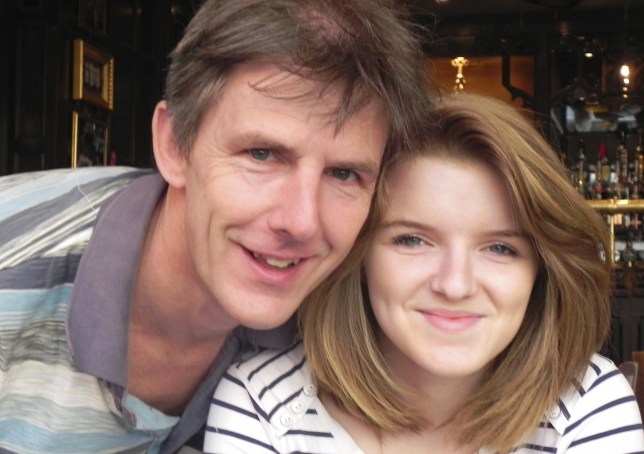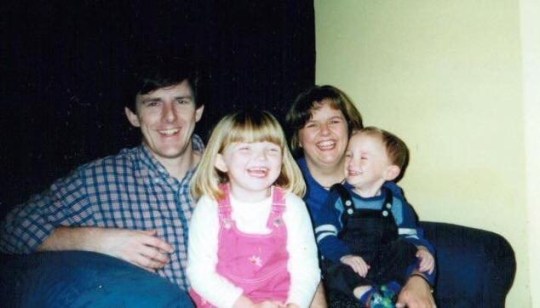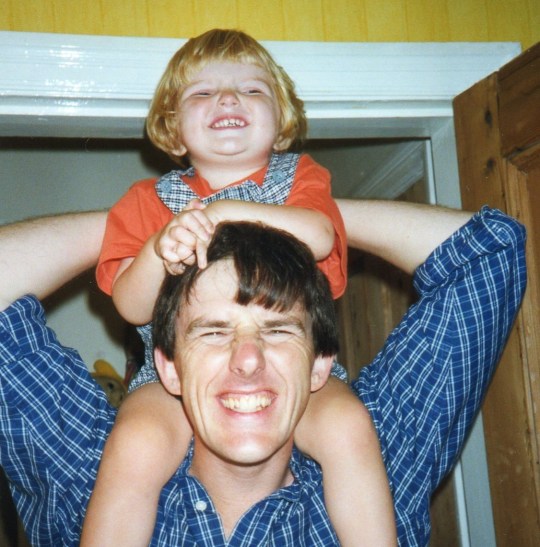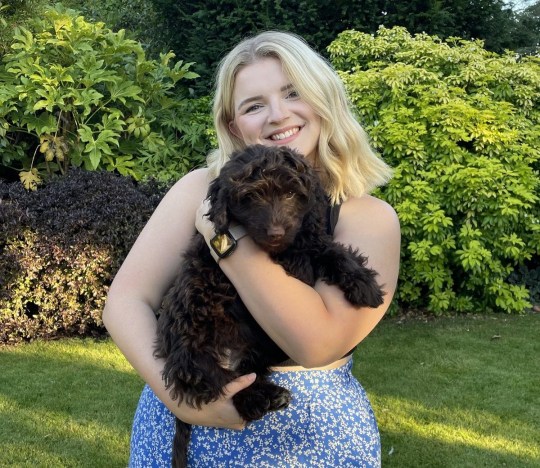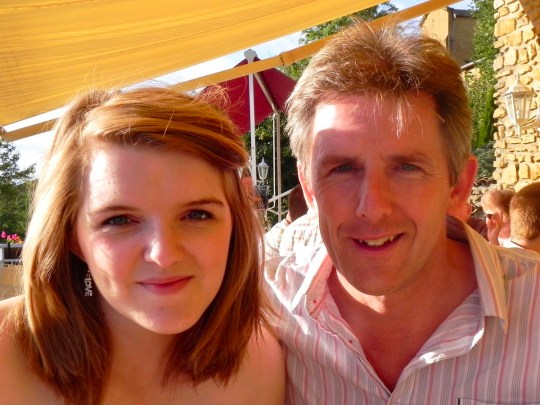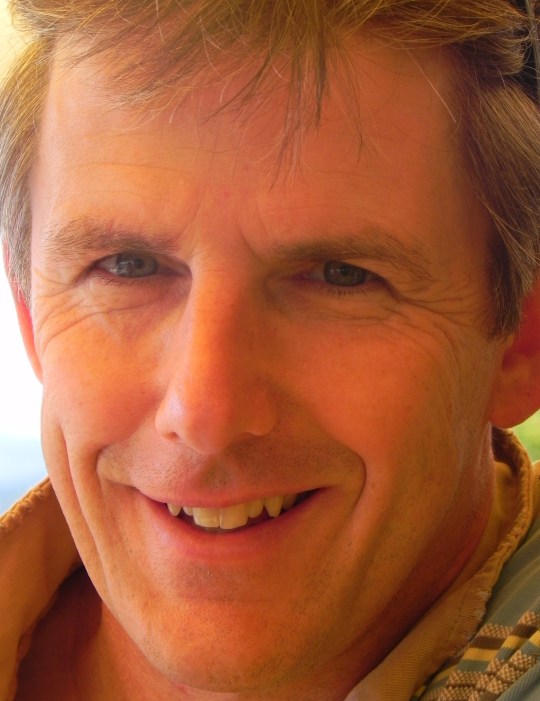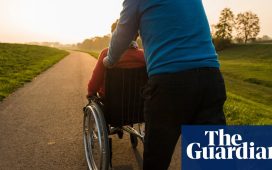It was New Year’s Day in 2012 and – while most of us were catching up on extra sleep or eating leftover turkey and chocolate – my dad was out for his daily morning run.
Dad was incredibly fit, so this was nothing out of the ordinary. At least until Mum told me that he was on the sofa after he had passed out as soon as he’d got home.
We didn’t think there was anything untoward going on, but he went to A&E to get checked out anyway.
I was just 15, and I had no idea that less than 18 months on from that incident, I’d be speaking at my dad’s funeral.
After that fainting episode, Dad spent the day in hospital. Yet, nothing came of it – he was sent home that evening after doctors were satisfied that his vitals seemed normal.
No bloods were taken, no scans or intensive tests carried out – and the consensus seemed to be that, as a 45-year-old man who had run on an empty stomach, he’d simply overexerted himself.
Unknown to me at the time, this had happened to Dad before.
Later, I found out that my dad had experienced several of these episodes in the past, where he passed out while driving the car and his friend had to take the wheel from him, as well as another time at his work as a school principal in front of his colleagues.
In fact, from October 2011, my dad went to his GP several times, feeling dizzy, nauseous, and losing weight. But his symptoms were dismissed as a side effect of his stressful job.
Rather than taking his symptoms seriously, one GP instead made a pun: ‘You’re like a soldier on guard, sometimes you’ll pass out.’
In the months that followed, Dad struggled to keep up with certain TV programmes he used to love – such as Inspector Morse – as he couldn’t follow the storyline. As well as constant headaches that painkillers wouldn’t touch the side of.
Then, on a midsummer 2012 afternoon, my family and I went out for lunch to celebrate my mum’s birthday. Dad had his usual headache, but this time it became so intense that he had to lie down on a bench outside.
The next day, Dad didn’t go to work due to his symptoms. That’s when a family friend popped in to check on him and – seeing his condition – my mum came home and took him straight to A&E.
After being assessed, my dad was told by a nurse in A&E that he didn’t qualify for a scan, as he didn’t tick all of the boxes required. It wasn’t until he vomited on another nurse that he was rushed through for that initial CT scan, where doctors discovered a tumour the size of a golf ball on the side of his head.
Originally, he was told that his grade four glioblastoma – a cancer so aggressive and deadly it has been dubbed ‘The Terminator’ – was inoperable.
The small room seems even smaller in my mind but I’ll never forget my dad’s face as he tried not to cry.
Dad was initially told he’d have just weeks to live. However, after being referred to a specialist at Addenbrooke’s Hospital in Cambridge, a surgeon managed to remove 90% of the tumour, which would give him around 10 months more with us all.
What followed was months of back-to-back radio and chemotherapy, as the brilliant team tried to slow down the progression of this aggressive cancer. It was them who had to tell us around the eight-month mark that Dad was indeed in his final weeks.
Nothing can prepare you for the anticipatory grief you feel, as every day passes and you try – and fail – to hold onto every minute with the person you love, before their time is up.
Dad died in May 2013 and the days and weeks that followed were the strangest of my life.
We wanted his funeral to be a celebration of his life and accomplishments, to cherish the lives he had shaped throughout his 46 years. As a result, Peterborough Cathedral was packed full of his students, colleagues, friends and family.
Still only 16, I decided I would read a eulogy. I wanted to make sure that Dad was remembered for how he was – full of humour and energy.
He was vibrant and squeezed the most out of every day. We’d go for long walks with the dogs at the weekend or bike rides that ended with a big ice cream sundae and he’d ask me a million and one questions about school.
He’d stand over me at 6am, inevitably waking me up, when he was going for a run to see if I wanted to come with him – all of which was quite annoying at the time, but how I miss it now.
He was ever the optimist and a joy to be around. The kind of person who, in a room full of chemotherapy patients, was trying to lighten the mood by telling the woman next to us: ‘It’s horrible that we’re in here, but at least we have comfy chairs!’
I still think about how my dad was initially treated, by his GP and then by A&E staff when he began to faint. If Dad’s symptoms had been taken seriously and he had a scan back in 2011, the outlook for his cancer could have been entirely different.
We might have had years, perhaps even decades, longer together.
Glioblastomas are grade 4 brain tumours
Some of the symptoms of Glioblastoma include:
- headaches, caused by pressure in the brain
- personality changes
- trouble remembering things
- trouble speaking or understanding
- tiredness
- depression
- trouble thinking
- seizures
- sight problems
Since Dad’s death 11 years ago, my grief has evolved with me. It’s not as all-consuming as it was. Sometimes it feels like a distant dream – our life before cancer – which I don’t often think about anymore as it’s too painful.
Time is one of the most precious resources we have. Quick diagnosis can give you more time, and the kind of treatment my dad received can also buy you more.
In order to improve this process between patients and medical professionals, The Brain Tumour Charity is calling for a National Brain Tumour Strategy. But in the meantime, individuals need to be vigilant, and if dismissed by medical professionals, they frankly need to be stubborn.
Get to know your body and what’s normal for you, and if you’re experiencing anything unusual, then get it checked – and if you know something is wrong even when told you are fine, get a second opinion.
Take it from me. It might just save your life.
Do you have a story you’d like to share? Get in touch by emailing James.Besanvalle@metro.co.uk.
Share your views in the comments below.
MORE : I thought he was too young for me. Until I did the most immature thing
MORE : My mum told me she never wanted children. I’ve granted her wish
MORE : Purple spots found on girl, 6, turned out out to be two forms of cancer
Sign up to our guide to what’s on in London, trusted reviews, brilliant offers and competitions. London’s best bits in your inbox
This site is protected by reCAPTCHA and the Google Privacy Policy and Terms of Service apply.

